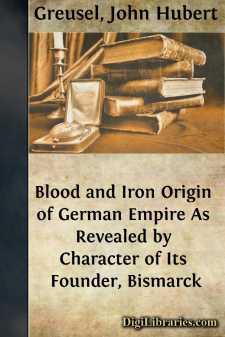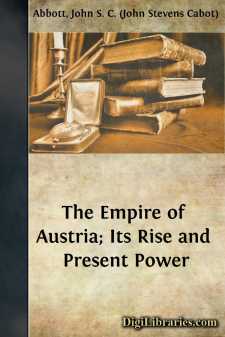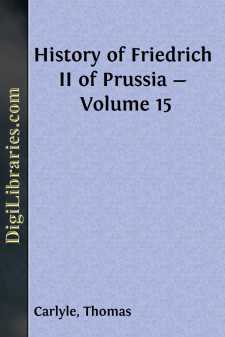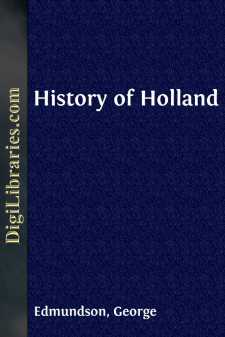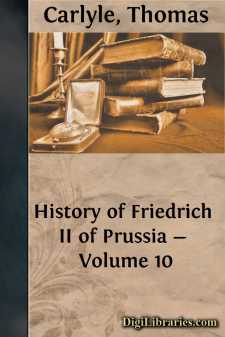History
- Africa 30
- Americas (North Central South West Indies) 50
- Ancient 68
- Asia 58
- Australia & New Zealand 8
- Canada 41
- Caribbean & West Indies 1
- Civilization 20
- Eastern Europe 12
- Europe
- Expeditions & Discoveries 60
- General 77
- Historical Geography 1
- Jewish 9
- Latin America 3
- Medieval 8
- Middle East 13
- Military 248
- Revolutionary 8
- Study & Teaching 5
- United States 353
- Western Europe 56
- World 13
Europe Books
Sort by:
CHAPTER I The Man Himself 1 Hark, Hark! The giant’s ponderous hammer rings on the anvil of destiny. Enter, thou massive figure, Bismarck, and in deadly earnest take thy place before Time’s forge. ¶ It is, it must be, a large story—big with destiny! The details often bore with their monotony; they do not at all times march on; they drag, but they do indeed never halt permanently; ahead always is...
more...
CHAPTER I. RHODOLPH OF HAPSBURG. From 1232 to 1291. Hawk's Castle.—Albert, Count of Hapsburg.—Rhodolph of Hapsburg.—His Marriage and Estates.—Excommunication and its Results.—His Principles of Honor.—A Confederacy of Barons.—Their Route.—Rhodolph's Election as Emperor of Germany.—The Bishop's Warning.—Dissatisfaction at the Result of the Election.—Advantages...
more...
Not many of us remember Otterbourne before the Railroad, the Church, or the Penny Post. It may be pleasant to some of us to try to catch a few recollections before all those who can tell us anything about those times are quite gone. To begin with the first that is known about it, or rather that is guessed. A part of a Roman road has been traced in Otterbourne Park, and near it was found a piece of...
more...
THE TUDOR PERIOD, 1485-1603 [Sidenote: An era of Revolutions] The historian of the future will, perhaps, affirm that the nineteenth century, with the last years of the eighteenth, has been a period more fraught with momentous events in the development of the nations than any equal period since the Christian era commenced. Yet striking as are the developments witnessed by the last four generations, the...
more...
by:
Thomas Carlyle
Chapter I.—PRELIMINARY: HOW THE MOMENT ARRIVED. Battle being once seen to be inevitable, it was Friedrich's plan not to wait for it, but to give it. Thanks to Friedrich Wilhelm and himself, there is no Army, nor ever was any, in such continual preparation. Military people say, "Some Countries take six months, some twelve, to get in motion for war: but in three weeks Prussia can be across the...
more...
by:
Thomas Carlyle
Chapter I. — FIFTH CRISIS IN THE KAISER'S SPECTRE-HUNT. The Crown-Prince's young Life being, by perverse chance, involved and as it were absorbed in that foolish question of his English Marriage, we have nothing for it but to continue our sad function; and go on painfully fishing out, and reducing to an authentic form, what traces of him there are, from that disastrous beggarly...
more...
by:
F. Jordan
FERDINAND VON SCHILL. Profound silence reigned in the valleys and gorges of Jena and Auerstadt. The battles were over. The victorious French had marched to Jena to repose for a few days, while the defeated Prussians had fled to Weimar, or were wandering across the fields and in the mountains, anxiously seeking for inaccessible places where they might conceal their presence from the pursuing enemy. A...
more...
by:
George Edmundson
CHAPTER I [pg.1] THE BURGUNDIAN NETHERLANDS The last duke of the ancient Capetian house of Burgundy dying in 1361 without heirs male, the duchy fell into the possession of the French crown, and was by King John II bestowed upon his youngest son, Philip the Hardy, Duke of Touraine, as a reward, it is said, for the valour he displayed in the battle of Poictiers. The county of Burgundy, generally known as...
more...
PREFACE The history of Giggleswick School has just two difficulties about it which need to be unravelled. The date of the foundation of the School or of the Chantry of the Rood and the origin of the Seal alone are of interest to the antiquary and I have failed to discover either. The remainder is the story of a school, which has always had a reputation in the educational world and at the same time has...
more...
by:
Thomas Carlyle
Chapter I. — MANSION OF REINSBERG. On the Crown-Prince's Marriage, three years ago, when the AMT or Government-District RUPPIN, with its incomings, was assigned to him for revenue, we heard withal of a residence getting ready. Hint had fallen from the Prince, that Reinsberg, an old Country-seat, standing with its Domain round it in that little Territory of Ruppin, and probably purchasable as was...
more...


